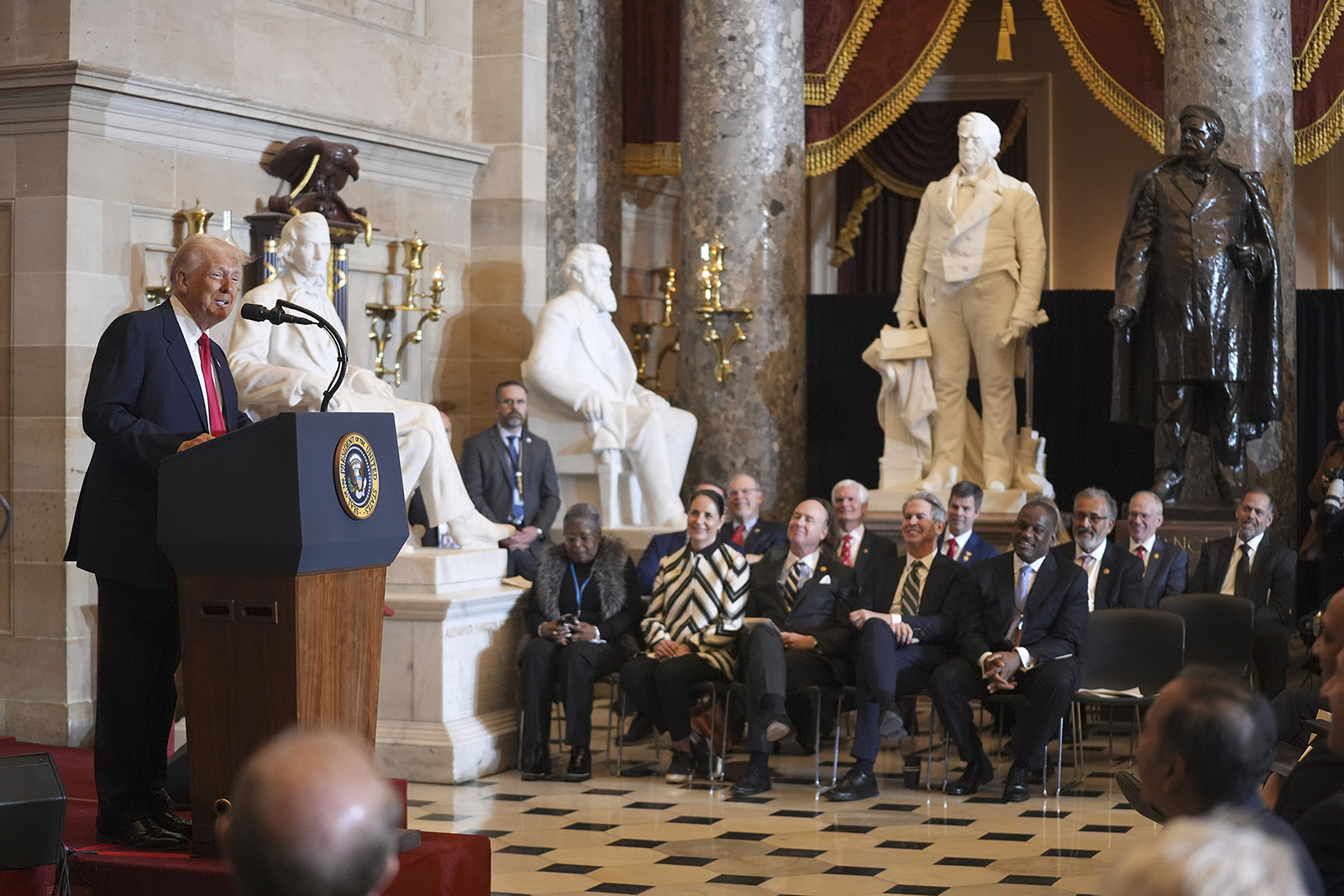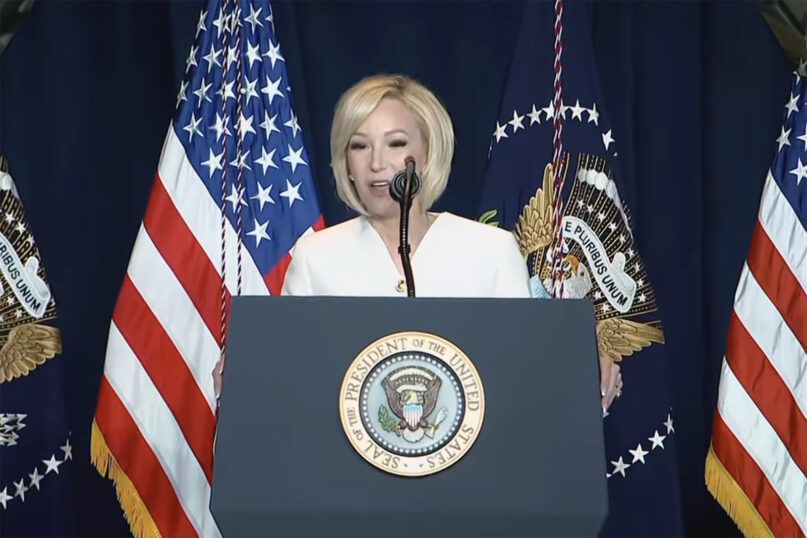
WASHINGTON (RNS) — Appearing at two events on Thursday (Feb. 6), both of them part of the festivities surrounding the National Prayer Breakfast, President Donald Trump spoke about the centrality of religious belief to the United States and announced that he would create a new presidential commission on religious liberty.
“From the earliest days of our republic, faith in God has always been the ultimate source of the strength that beats in the hearts of our nation,” Trump said in his first appearance in front of a gathering of lawmakers in the U.S. Capitol’s Statuary Hall. “We have to bring religion back. We have to bring it back much stronger.”
Later, at a separate NPB Gathering at the Washington Hilton hotel, Trump announced he would appoint Florida Pastor Paula White to lead his White House faith office, as she did at the end of the first Trump administration.
At the Capitol, talking to members of Congress from both parties, Trump expressed hope that lawmakers will find common ground, specifically mentioning transgender rights, which he inveighed against during his presidential campaign. He related a conversation with a transgender rights supporter who opposed the president’s recent executive order banning transgender women from women’s sports. While he didn’t agree with the person, Trump added, “He’s a good person, and just believes it.”
Trump, once identifying as a Presbyterian but in recent years calling himself a nondenominational Christian, closed his speech to lawmakers with an endorsement of religious belief. “I really believe you can’t be happy without religion, without that belief,” Trump said.
The remarks came as his administration finds itself at odds with several religious groups that have objected to recent orders halting humanitarian aid, ending the U.S. refugee program and giving law enforcement officials permission to raid houses of worship in search of migrants. Several administration figures, including Elon Musk and Vice President JD Vance, have criticized U.S. Catholic bishops and other faith leaders for their use of federal funds.
RELATED: Biden tells dueling prayer breakfasts that ‘diversity is one of our greatest strengths’
The National Prayer Breakfast, which has been held since 1953, was convened for most of its history by the International Foundation, a Christian group more familiarly referred to as “The Family,” and for decades met at the Washington Hilton.
Beginning in 2010, after the publication of journalist Jeff Sharlet’s 2008 book on the group, questions arose about how the breakfast granted access for conservative Christians to the White House and Congress. In 2023, a new organization held its breakfast on Capitol Hill, while many of the previous organizers of the International Foundation continued to meet at the hotel.
Trump saved his announcements about the new religious liberty commission and the return of White for the crowd of thousands at the Hilton. After White introduced the president, he said, “This week, I’m also creating the White House faith office led by Pastor Paula White, who is so amazing.”
Trump did not give any other details about the commission, other than saying: “It’s going to be a very big deal, which will work tirelessly to uphold this most fundamental right. Unfortunately, in recent years, we’ve seen the sacred liberty threatened like never before in American history.”
The president also said he will create a task force, which will be overseen by Attorney General Pam Bondi, that will “eradicate anti-Christian bias,” making good on a promise he made on the campaign trail.

Pastor Paula White introduces President Donald Trump during the NPB Gathering at the Washington Hilton, Feb. 6, 2025, in Washington. (Video screen grab)
Trump pointed to his recent decision to pardon 23 anti-abortion protesters who were convicted of illegally blockading a reproductive health clinic in D.C. as evidence of his dedication to the cause.
The White House faith-based office was originally instituted by President George W. Bush as the Office of Faith-Based and Community Initiatives to coordinate outreach to faith communities and help foster economic opportunity. President Barack Obama recast it as the Office of Faith-Based and Neighborhood Partnerships, a name later reinstated by Joe Biden.
In the past, the director of the faith-based initiative has been involved with supporting national and Cabinet-level efforts to partner with religious and community groups to address social needs, from fighting the Ebola virus to feeding hungry schoolchildren.
In his first administration, Trump only set up his version of the office, under White, late in his administration, but White had already been filling some functions in connecting the White House to faith groups, mostly evangelical pastors.
On Tuesday, religious groups that help resettle refugees in the United States demonstrated outside the White House to protest the administration’s decision to bar refugees from the country and the administration’s alleged refusal to pay for already completed resettlement work. Musk, the president’s adviser and head of the Department of Government Efficiency, has alleged — without evidence — that federal funding for various Lutheran organizations that perform humanitarian work is “illegal.”
Vance has chastised the U.S. Conference of Catholic Bishops for joining with an array of religious groups that have condemned the president’s executive orders related to immigration, questioning the prelates’ motivations as rooted in a concern for their “bottom line.”
RELATED: Amid criticism from religious detractors, Vance speaks at religious freedom summit
Several Quaker groups have filed a lawsuit aimed at overturning an executive order rescinding the sensitive-locations policy, which discouraged immigration enforcement agents from raiding schools, hospitals and churches. The groups say the order violates the Religious Freedom Restoration Act. On Wednesday, the Cooperative Baptist Fellowship joined the suit.
Trump spent his first full day in office sparring with the Rt. Rev. Mariann Budde, with the president decrying the Episcopal bishop of Washington as a “so-called bishop” for a sermon at the Washington National Cathedral in which she pleaded with Trump to have mercy on transgender children and immigrants.
As they have in the past, atheist and secular groups criticized the prayer gatherings themselves as an inappropriate mixing of politics and religion. The Freedom From Religion Foundation Action Fund joined other groups in a letter urging members of Congress not to attend the breakfasts or related events.
In a separate letter to House Speaker Mike Johnson, four members of Congress called the Statuary Hall event “an affront to the Establishment Clause” of the U.S. Constitution that “promotes division by excluding certain people while privileging others.”
“Just as there will always be prayer in school as long as there are math tests, there will always be prayer in the Capitol as long as there are tough votes,” Scott MacConomy, director of policy and government affairs for the Secular Coalition for America, told RNS. “That doesn’t mean it should be institutionalized with an annual event inside the Capitol near the statue of Thomas Jefferson, the author of the ‘wall of separation’ between church and state.”
Richa Karmarkar and Adelle M. Banks contributed to this report.
RELATED: National Prayer Breakfast breaks from ‘The Family’ with new organization
